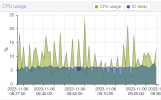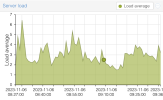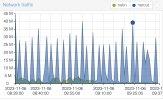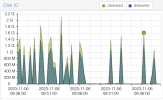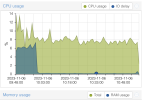INFO: Starting Backup of VM 107 (qemu)
INFO: Backup started at 2023-11-06 04:46:46
INFO: status = running
INFO: VM Name: windows-11
INFO: include disk 'sata0' 'ZFS-Data:vm-107-disk-1' 121433M
INFO: include disk 'efidisk0' 'ZFS-Data:vm-107-disk-0' 1M
INFO: backup mode: snapshot
INFO: ionice priority: 7
INFO: creating vzdump archive '/mnt/pve/proxmox-backups/dump/vzdump-qemu-107-2023_11_06-04_46_46.vma.zst'
INFO: issuing guest-agent 'fs-freeze' command
INFO: issuing guest-agent 'fs-thaw' command
INFO: started backup task '6ca45e01-f694-4e30-9a4e-0d235db706c1'
INFO: resuming VM again
INFO: 0% (300.9 MiB of 118.6 GiB) in 3s, read: 100.3 MiB/s, write: 74.3 MiB/s
INFO: 1% (1.2 GiB of 118.6 GiB) in 44s, read: 23.0 MiB/s, write: 21.5 MiB/s
INFO: 2% (2.4 GiB of 118.6 GiB) in 54s, read: 122.5 MiB/s, write: 121.0 MiB/s
INFO: 3% (3.6 GiB of 118.6 GiB) in 1m 39s, read: 27.2 MiB/s, write: 26.1 MiB/s
INFO: 4% (4.8 GiB of 118.6 GiB) in 23m 13s, read: 935.0 KiB/s, write: 916.2 KiB/s
INFO: 5% (6.0 GiB of 118.6 GiB) in 23m 24s, read: 118.3 MiB/s, write: 84.4 MiB/s
INFO: 6% (7.1 GiB of 118.6 GiB) in 23m 27s, read: 371.0 MiB/s, write: 367.6 MiB/s
INFO: 7% (8.4 GiB of 118.6 GiB) in 23m 36s, read: 142.6 MiB/s, write: 138.0 MiB/s
INFO: 8% (9.5 GiB of 118.6 GiB) in 24m 41s, read: 17.7 MiB/s, write: 16.7 MiB/s
INFO: 9% (10.8 GiB of 118.6 GiB) in 24m 50s, read: 146.2 MiB/s, write: 142.3 MiB/s
INFO: 10% (11.9 GiB of 118.6 GiB) in 25m 22s, read: 35.1 MiB/s, write: 32.8 MiB/s
INFO: 11% (13.1 GiB of 118.6 GiB) in 26m 18s, read: 21.6 MiB/s, write: 20.4 MiB/s
INFO: 12% (14.3 GiB of 118.6 GiB) in 26m 57s, read: 33.5 MiB/s, write: 32.0 MiB/s
INFO: 13% (15.5 GiB of 118.6 GiB) in 27m 4s, read: 168.3 MiB/s, write: 158.6 MiB/s
INFO: 14% (16.7 GiB of 118.6 GiB) in 27m 53s, read: 25.2 MiB/s, write: 24.0 MiB/s
INFO: 15% (17.9 GiB of 118.6 GiB) in 28m 52s, read: 20.5 MiB/s, write: 19.8 MiB/s
INFO: 16% (19.0 GiB of 118.6 GiB) in 28m 59s, read: 168.8 MiB/s, write: 163.5 MiB/s
INFO: 17% (20.2 GiB of 118.6 GiB) in 30m, read: 20.3 MiB/s, write: 19.5 MiB/s
INFO: 18% (21.5 GiB of 118.6 GiB) in 31m 6s, read: 19.0 MiB/s, write: 18.7 MiB/s
INFO: 19% (22.6 GiB of 118.6 GiB) in 33m 48s, read: 7.0 MiB/s, write: 6.9 MiB/s
INFO: 20% (23.8 GiB of 118.6 GiB) in 33m 55s, read: 179.2 MiB/s, write: 170.9 MiB/s
INFO: 21% (24.9 GiB of 118.6 GiB) in 34m 58s, read: 18.3 MiB/s, write: 17.7 MiB/s
INFO: 22% (26.2 GiB of 118.6 GiB) in 36m 40s, read: 13.1 MiB/s, write: 12.9 MiB/s
INFO: 23% (27.3 GiB of 118.6 GiB) in 39m 39s, read: 6.2 MiB/s, write: 6.1 MiB/s
INFO: 24% (28.9 GiB of 118.6 GiB) in 39m 46s, read: 226.2 MiB/s, write: 137.6 MiB/s
INFO: 26% (31.8 GiB of 118.6 GiB) in 39m 49s, read: 991.2 MiB/s, write: 92.9 MiB/s
INFO: 27% (32.4 GiB of 118.6 GiB) in 39m 52s, read: 209.0 MiB/s, write: 202.5 MiB/s
INFO: 28% (33.3 GiB of 118.6 GiB) in 40m 9s, read: 58.9 MiB/s, write: 57.9 MiB/s
INFO: 29% (34.5 GiB of 118.6 GiB) in 42m 3s, read: 10.3 MiB/s, write: 10.2 MiB/s
INFO: 30% (35.6 GiB of 118.6 GiB) in 42m 20s, read: 65.9 MiB/s, write: 63.6 MiB/s
INFO: 31% (36.8 GiB of 118.6 GiB) in 45m 11s, read: 7.4 MiB/s, write: 7.2 MiB/s
INFO: 32% (37.9 GiB of 118.6 GiB) in 46m 18s, read: 17.4 MiB/s, write: 16.7 MiB/s
INFO: 33% (39.2 GiB of 118.6 GiB) in 48m 5s, read: 11.7 MiB/s, write: 11.4 MiB/s
INFO: 34% (40.5 GiB of 118.6 GiB) in 51m 5s, read: 7.3 MiB/s, write: 7.2 MiB/s
INFO: 35% (41.6 GiB of 118.6 GiB) in 51m 16s, read: 107.1 MiB/s, write: 105.1 MiB/s
INFO: 36% (42.7 GiB of 118.6 GiB) in 54m 30s, read: 5.8 MiB/s, write: 5.6 MiB/s
INFO: 37% (43.9 GiB of 118.6 GiB) in 54m 40s, read: 122.5 MiB/s, write: 118.3 MiB/s
INFO: 38% (45.2 GiB of 118.6 GiB) in 56m 46s, read: 10.5 MiB/s, write: 10.1 MiB/s
INFO: 39% (46.3 GiB of 118.6 GiB) in 56m 55s, read: 123.7 MiB/s, write: 119.0 MiB/s
INFO: 40% (47.4 GiB of 118.6 GiB) in 59m 43s, read: 7.2 MiB/s, write: 6.7 MiB/s
INFO: 41% (48.7 GiB of 118.6 GiB) in 59m 48s, read: 263.2 MiB/s, write: 113.2 MiB/s
INFO: 42% (49.8 GiB of 118.6 GiB) in 1h 2m 53s, read: 6.1 MiB/s, write: 6.0 MiB/s
INFO: 43% (51.0 GiB of 118.6 GiB) in 1h 3m 9s, read: 74.5 MiB/s, write: 73.4 MiB/s
INFO: 44% (52.4 GiB of 118.6 GiB) in 1h 6m 11s, read: 7.7 MiB/s, write: 7.4 MiB/s
INFO: 45% (53.4 GiB of 118.6 GiB) in 1h 6m 35s, read: 42.6 MiB/s, write: 33.3 MiB/s
INFO: 46% (54.7 GiB of 118.6 GiB) in 1h 9m 23s, read: 7.9 MiB/s, write: 7.7 MiB/s
INFO: 47% (55.9 GiB of 118.6 GiB) in 1h 11m 47s, read: 8.4 MiB/s, write: 7.9 MiB/s
INFO: 48% (57.0 GiB of 118.6 GiB) in 1h 12m 17s, read: 38.3 MiB/s, write: 36.2 MiB/s
INFO: 49% (58.2 GiB of 118.6 GiB) in 1h 13m 51s, read: 13.0 MiB/s, write: 11.5 MiB/s
INFO: 50% (59.4 GiB of 118.6 GiB) in 1h 16m 38s, read: 7.7 MiB/s, write: 7.3 MiB/s
INFO: 51% (60.6 GiB of 118.6 GiB) in 1h 16m 47s, read: 137.8 MiB/s, write: 119.6 MiB/s
INFO: 52% (61.7 GiB of 118.6 GiB) in 1h 19m 37s, read: 6.7 MiB/s, write: 5.5 MiB/s
INFO: 53% (62.9 GiB of 118.6 GiB) in 1h 19m 45s, read: 150.4 MiB/s, write: 115.2 MiB/s
INFO: 54% (64.1 GiB of 118.6 GiB) in 1h 22m 26s, read: 7.3 MiB/s, write: 5.5 MiB/s
INFO: 55% (65.3 GiB of 118.6 GiB) in 1h 23m 38s, read: 17.1 MiB/s, write: 12.6 MiB/s
INFO: 56% (66.4 GiB of 118.6 GiB) in 1h 25m 19s, read: 12.0 MiB/s, write: 9.0 MiB/s
INFO: 57% (67.6 GiB of 118.6 GiB) in 1h 28m 11s, read: 7.1 MiB/s, write: 5.5 MiB/s
INFO: 58% (68.9 GiB of 118.6 GiB) in 1h 28m 18s, read: 183.8 MiB/s, write: 129.3 MiB/s
INFO: 59% (70.1 GiB of 118.6 GiB) in 1h 30m 41s, read: 8.3 MiB/s, write: 5.8 MiB/s
INFO: 60% (71.4 GiB of 118.6 GiB) in 1h 31m 9s, read: 48.4 MiB/s, write: 8.2 MiB/s
INFO: 61% (72.5 GiB of 118.6 GiB) in 1h 31m 15s, read: 181.9 MiB/s, write: 119.8 MiB/s
INFO: 62% (73.7 GiB of 118.6 GiB) in 1h 31m 34s, read: 68.5 MiB/s, write: 50.1 MiB/s
INFO: 63% (74.8 GiB of 118.6 GiB) in 1h 33m 11s, read: 11.5 MiB/s, write: 6.7 MiB/s
INFO: 64% (75.9 GiB of 118.6 GiB) in 1h 33m 18s, read: 165.2 MiB/s, write: 123.7 MiB/s
INFO: 65% (77.2 GiB of 118.6 GiB) in 1h 36m 7s, read: 7.9 MiB/s, write: 6.5 MiB/s
INFO: 66% (78.6 GiB of 118.6 GiB) in 1h 36m 13s, read: 229.0 MiB/s, write: 122.4 MiB/s


